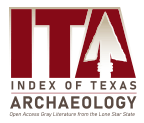Home > Research Projects and Centers > Center for Regional Heritage Research > Index of Texas Archaeology > Vol.
Agency
Texas Historical Commission
Abstract
Horizon Environmental Services, Inc. (Horizon) was selected by Pflugerville Independent School District (ISD) to conduct an intensive cultural resources inventory and assessment of the proposed location of Pflugerville ISD’s High School No. 4 Project. The proposed High School No. 4 tract consists of an approximately 65.3-hectare (161.4-acre) tract located off the southeast side of Weiss Lane between Jesse Bohls Drive to the northeast and Pflugerville Road to the southwest in eastern Pflugerville, Travis County, Texas. The project area would consist of the entire 65.3-hectare (161.4-acre) tract.
The proposed undertaking is being sponsored by Pflugerville ISD, which represents a political subdivision of the state of Texas, on land owned by Pflugerville ISD; as such, the project falls under the jurisdiction of the Antiquities Code of Texas (Texas Natural Resources Code of 1977, Title 9, Chapter 191). No federal jurisdiction has been identified for the project at this time. As the project represents a publicly sponsored undertaking with the potential to impact significant cultural resources, Pflugerville ISD was required to provide for a cultural resources inventory of the project area.
On March 6, 2015, Horizon archeological technicians Briana Nicole Smith and Jared Wiersema, under the overall direction of Jeffrey D. Owens, Principal Investigator, performed an intensive cultural resources survey of the project area to locate any cultural resources that potentially would be impacted by the proposed undertaking. Horizon’s archeologists traversed the 65.3-hectare (161.4-acre) tract in parallel, linear transects spaced no more than 30.5 meters (100.0 feet) apart and thoroughly inspected the modern ground surface for aboriginal and historicage cultural resources. The project area consists of an active agricultural field that had most recently been planted in corn, though crops had not yet been planted for the coming growing season at the time of Horizon’s survey. The project area was largely free of vegetation aside from a small copse of hackberry and elm trees, saplings, and overgrown vines and grasses in the southeastern corner, and visibility of the modern ground surface was characteristically excellent (100%). The cultural resources survey was conducted under Texas Antiquities Permit No. 7206.
In addition to pedestrian walkover, the Texas State Minimum Archeological Survey Standards (TSMASS) require the excavation of 1 shovel test per 3 acres for project areas measuring between 100 and 200 acres in size; thus, a minimum of 54 shovel tests were required within the 65.3-hectare (161.4-acre) project area to meet the TSMASS. Horizon excavated a total of 63 shovel tests during the survey, thereby exceeding the TSMASS for a project area of this size.
One newly recorded archeological site, 41TV2478, was recorded during the survey. The site consists of a small, abandoned, late 19th- to mid-20th-century, 2-room farmhouse situated in a small copse of trees in the southeastern corner of the project area. A low-density scatter of domestic debris, including glass shards (clear, opaque, dark brown, and amethyst), whiteware ceramic sherds, a marble, 2 metal doorknobs, and metal scrap, surrounds the immediate vicinity of the farmhouse. The surrounding area consists of an active agricultural field. Based on the small size of the farmhouse and lack of associated structures or features, this structure likely represents the remnants of a tenant farmhouse situated on a larger farm. An inhabited farm complex, consisting of a large farmhouse with numerous outbuildings, is located outside the project area approximately 190.0 meters (623.2 feet) northwest of the structure and may represent the main farmstead. Due to the dilapidated condition of the structure and the lack of integrity of the sparse, surficial artifact scatter, site 41TV2478 possesses minimal research value and is recommended as ineligible for designation as a State Antiquities Landmark (SAL). Additional archival research would be necessary to determine if the occupants of the site were of historical significance or if the farmstead was part of larger historical events. However, as late 19th- to 20th-century farmsteads represent a common site type in Central Texas, they typically must retain substantial integrity of feeling, association, and setting in order to meet the criteria of significance for designation as SALs. Based on the minimal integrity of site 41TV2478, it is unlikely that the results of any additional archival research would be sufficient to elevate the significance of the site enough to warrant designation as an SAL.
Based on the results of the survey-level investigations documented in this report, no potentially significant cultural resources would be affected by the proposed undertaking. In accordance with 36 CFR 800.4, Horizon has made a reasonable and good-faith effort to identify historic properties within the project area. No cultural resources were identified within the project area that meet the criteria for designation as SALs according to 13 TAC 26, and no further archeological work is recommended in connection with the proposed undertaking. However, human burials, both prehistoric and historic, are protected under the Texas Health and Safety Code. In the event that any human remains or burial objects are inadvertently discovered at any point during construction, use, or ongoing maintenance in the project area, even in previously surveyed areas, all work should cease immediately in the vicinity of the inadvertent discovery, and the Texas Historical Commission (THC) should be notified immediately.
Creative Commons License

This work is licensed under a Creative Commons Attribution-NonCommercial 4.0 International License
Included in
American Material Culture Commons, Archaeological Anthropology Commons, Environmental Studies Commons, Other American Studies Commons, Other Arts and Humanities Commons, Other History of Art, Architecture, and Archaeology Commons, United States History Commons
Submission Location
Tell us how this article helped you.


